[ad_1]
Wave Accounting and ZipBooks are two popular accounting software options that both offer a forever free tier of service. This forever free plan has made these platforms popular among small business owners on a budget.
To help you decide if Wave Accounting or ZipBooks is right for your business, we compare them in this guide.
Wave Accounting vs. ZipBooks: Comparison table
| Features | Wave | ZipBooks |
|---|---|---|
| Starting price for paid plans | $16/mo. | $15/mo. |
| Users on free plan | 1 | 1 |
| Bank accounts on free plan | Unlisted | 1 |
| Invoices on free plan | Unlimited | Unlimited |
| Double-entry accounting | Yes | Yes |
| Customized invoices | Yes | Yes |
| Mobile receipt capture | $11 a month with free plan | Free with all plans |
| Native payroll add-on | Yes | No |
| Payment processing | All major credit cards and direct from bank accounts | All major credit cards or integration with PayPal, Square or Stripe |
| Native time tracking | No | Yes |
| Visit Wave | Visit ZipBooks |
Wave Accounting vs. ZipBooks: Pricing
Wave Accounting pricing
Wave Accounting has two accounting plans: A bare-bones free plan and a slightly more robust paid plan. Other features can be purchased on an a la carte basis. The pricing structure is as follows:
- Wave Accounting Starter: Free forever.
- Wave Accounting Pro: $16 per month or $170 per year.
Wave Accounting Pro includes unlimited receipt scanning at no additional cost. Those using the free plan may add receipt scanning for an additional fee of $11 per month (or $96 per year).
Wave’s other services include the following:
- Payroll: $40 per month in tax service states and $20 per month in self-service states, plus $6 per active employee or independent contractor paid each month.
- Advisors: $149 per month for ongoing bookkeeping support, or $379 for a one-time accounting and payroll coaching package.
A 30-day free trial of the payroll software is available.
Learn more in our Wave Accounting review.
ZipBooks pricing
ZipBooks follows a more traditional pricing structure, with an entry-level free plan followed by increasing pricing tiers:
- Starter: Free forever for one user and one connected bank account.
- Smarter: $15 per month.
- Sophisticated: $35 per month.
- Accountant: Contact the sales team for a pricing quote.
A 30-day free trial is available for both the Smarter and Sophisticated plans.
Wave Accounting vs. ZipBooks: Feature comparison
Forever free plan
Both Wave and ZipBooks offer forever free plans, but they each offer slightly different features with different limitations.
With Wave’s free plan, businesses can send an unlimited number of invoices to an unlimited number of clients per month. You can customize invoices to include your business’s logo and colors. Users can also accept online payments with processing fees starting at 2.9% + $0.60 per credit card transaction. Wave’s free plan is limited to one user only.
SEE: Wave Accounting vs. QuickBooks: Accounting Software Comparison
ZipBooks’s free plan also limits customers to one user only. It also limits you to just one connected bank account — although invoices, vendors and customers are unlimited. If you need more, you’ll need to upgrade to a paid plan. These limits mean that ZipBooks (Figure A) is best suited to freelancers and solopreneurs, as well as very small businesses where no one else will need to access the accounting software.
Figure A
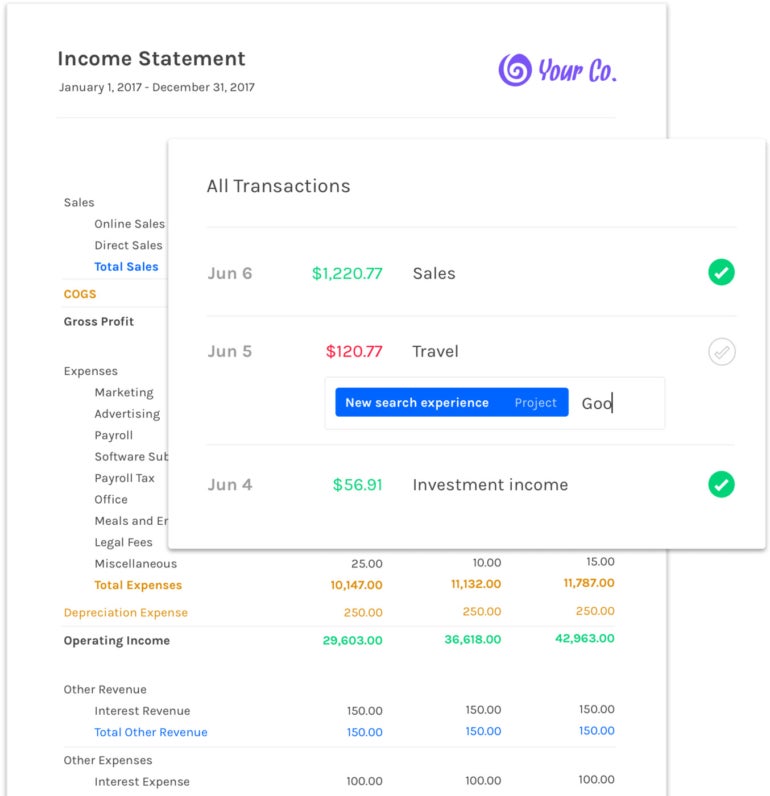
Accounting
Wave uses double-entry accounting to make things easy on your accountant. The smart dashboard (Figure B) centralizes your income, expenses, payments and invoices all in one place. Wave offers basic reports on essentials like profit and loss statements, balance sheets and cash flow to give you insight into the health of your business. For security purposes, bank data connections are read-only and use 256-bit encryption.
Figure B
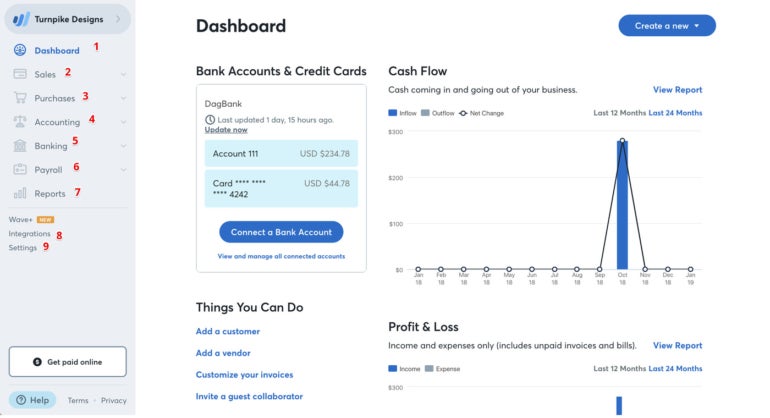
ZipBooks also uses the double-entry accounting approach. It automatically pulls in transaction information from your bank or banks and makes it easy to reconcile all your bank accounts. It automatically categorizes your transactions and tracks the money you make and the amounts owed in your accounts receivable report. It also lets you perform project-based accounting through tagging and time tracking.
Invoicing and billing
Wave lets you create professional-looking invoices quickly, then send them directly to your customers in seconds. Set up recurring billing for repeat customers and access all your customer information in one place. The invoicing and billing information flows right over into the accounting tool, minimizing accounting work required.
SEE: Wave vs. Xero: Accounting Software Comparison
ZipBooks also lets you customize your invoices (Figure C) and provide suggestions for improving them. Plus, you can create estimates and later convert them into invoices with a click of a button. Track whether or not your invoices have been viewed, set up recurring billing and automatically remind customers to pay outstanding bills.
Figure C
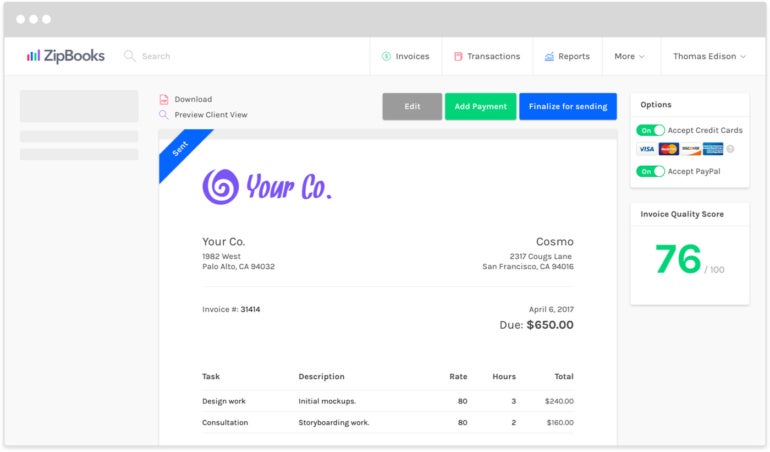
Expense management
Wave gives you the option to track receipts through its mobile app (Figure D). The app uses OCR technology to scan receipts and import data in seconds, and you can add up to 10 receipts in bulk at a time. Wave also backs up your receipts to the cloud in case anything goes wrong with the app.
Figure D
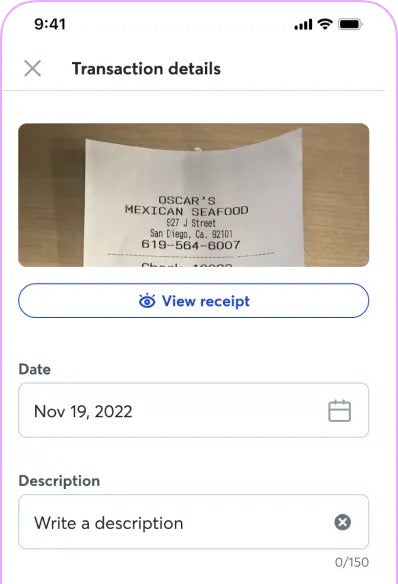
While Wave’s receipt-scanning tool is included in the base price of the Wave Pro plan, Wave Starter users pay a fee of $11 per month or $96 per year to access the feature.
In contrast, ZipBook’s mobile app also makes it possible to capture receipts on the go, but it’s a free feature for all accounts. Plus, you can automatically add billable expenses to invoices and split an expense across multiple categories for more accurate accounting. You can also manage your vendors and how much you owe them in the interface.
Payroll
Wave can be used for purely accounting and invoicing tasks. However, if you also need a payroll software, you can pay for Wave Payroll as an add-on (Figure E). The payroll and accounting tools easily connect to increase accuracy and reduce time spent on manual bookkeeping. Wave can currently calculate and file payroll taxes in 14 states, with more in the works, and it can generate W-2 and 1099 forms for tax season. It will also directly deposit wages and let employees manage their pay stubs through a self-service portal.
Figure E
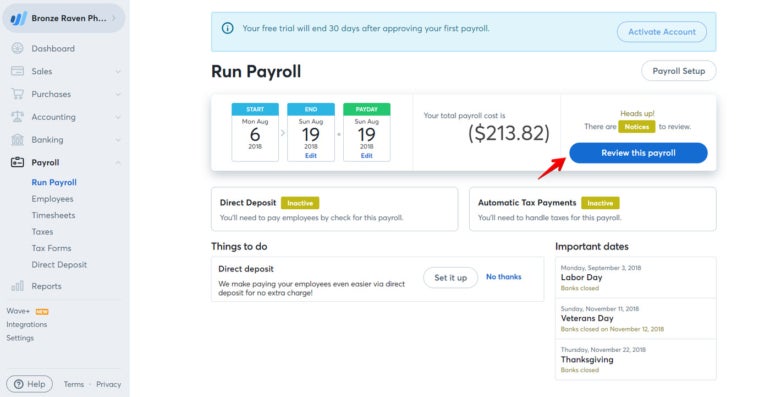
On the other hand, ZipBooks does not offer a native payroll tool and instead relies on an integration with Gusto for payroll. Gusto is a highly rated payroll service. To learn more about it, take a look at our full Gusto review.
Payment processing
Wave allows you to accept payments directly instead of forcing you to use a third-party tool, and it charges transparent payment processing fees. Wave accepts all major cards: Mastercard, Visa and American Express. With Wave, you can accept credit card payments online, over the phone or in person. It’s also compatible with Apple Pay and accepts payments from bank accounts. Wave is PCI Level-1 certified for handling credit card and bank account information.
ZipBooks says it also accepts all major credit cards, though it doesn’t specify which ones, and it charges a processing fee of 2.9% per transaction. ZipBooks also integrates with PayPal, Square and Stripe (Figure F), each of which charges slightly different payment processing fees. And you’ll need to update to a paid plan if you want to accept Stripe payments.
Figure F
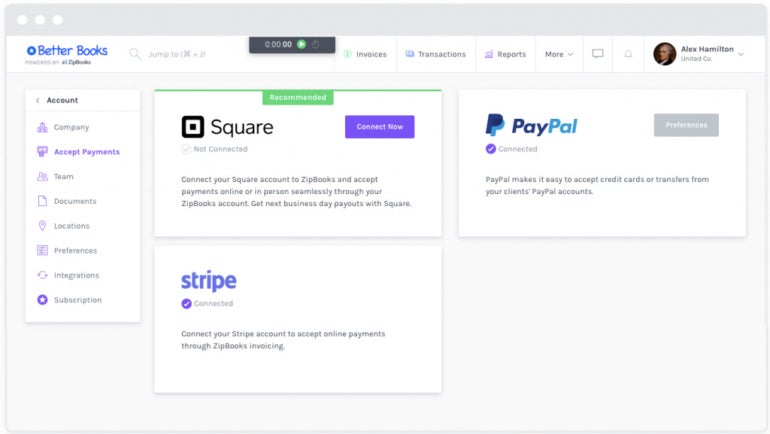
Integrations
Wave does not offer any native pre-built integrations. Instead, you must use a third-party service like Zapier or Zoho Flow to connect with outside apps.
SEE: The Top Wave Accounting Competitors and Alternatives
In contrast, ZipBooks offers a few limited integrations with Gusto, Stripe, Square and PayPal. For all other integrations, you must use a third-party service as well.
Wave Accounting pros and cons
Pros of Wave Accounting
- Free forever plan with no limits on bank account connections.
- Native payroll add-on option.
- Can manage multiple businesses in one accounting software.
- Very user-friendly software and setup.
Cons of Wave Accounting
- Accounting is not as robust as pricier competitors like Quickbooks.
- No customer service available with free plan.
- Support limited to email and live chat only with paid plan.
- No native time tracking feature.
- Some U.S. states are limited to self-service payroll only.
ZipBooks pros and cons
Pros of ZipBooks
- Unlimited invoices, vendors and customers on the free plan.
- Native time tracking included.
- Paid pricing tiers are very affordable.
- Project accounting and tracking.
Cons of ZipBooks
- Free plan limited to one user and one bank account.
- Could use more reports.
- No Android app available.
- Support limited to email and live chat only.
Methodology
To compare Wave accounting and ZipBooks, we considered features such as double-entry accounting, invoicing, mobile receipt capture, payroll services, payment processing and reporting templates. We also weighed factors such as pricing, ease of use and customer support accessibility. While writing this review, we consulted product documentation and read user reviews.
Should your organization use Wave Accounting or ZipBooks?
Wave offers a simple, no-frills accounting software that will suffice for many small businesses. The free plan offers a solid range of features, including unlimited invoicing and income tracking. However, its accounting features are not complex enough for growing or larger businesses. Payroll and mobile receipt capture are available but only as paid add-ons, and Wave does not integrate with third-party payment platforms.
The limitations of ZipBooks’ free plan — just one user and one connected bank account — mean it’s best suited to freelancers, solopreneurs and very small businesses. However, it does offer unlimited invoices, vendors and customers on the free plan. Its time tracking and tagging features make it a good choice for project-based accounting as well. It offers free receipt capture for all plans via its iOS mobile app, though no Android app is currently available. ZipBooks also integrates with three major payment services.
Both Wave and ZipBooks are great solutions for entrepreneurs and small-business owners looking for forever free accounting software. However, the complexity of their software can’t match that of paid competitors, including the ever-popular QuickBooks, making these platforms a good choice for businesses with simple accounting needs.
If neither Wave Accounting nor ZipBooks feels right for your needs, check out our recommendations for the best accounting software for small businesses.
Featured accounting solutions
1
Acumatica Cloud ERP
Acumatica Cloud ERP offers powerful finance and business intelligence tools to streamline company-wide accounting processes. Track costs, control billing, and manage time/expenses with multi-currency support and powerful financial reports. Acumatica makes real-time financial data available anytime, anywhere, on any device. Harness this data to make informed accounting decisions, reduce workloads, close the books faster, accelerate growth, and transform how you do business in the digital economy.
[ad_2]
